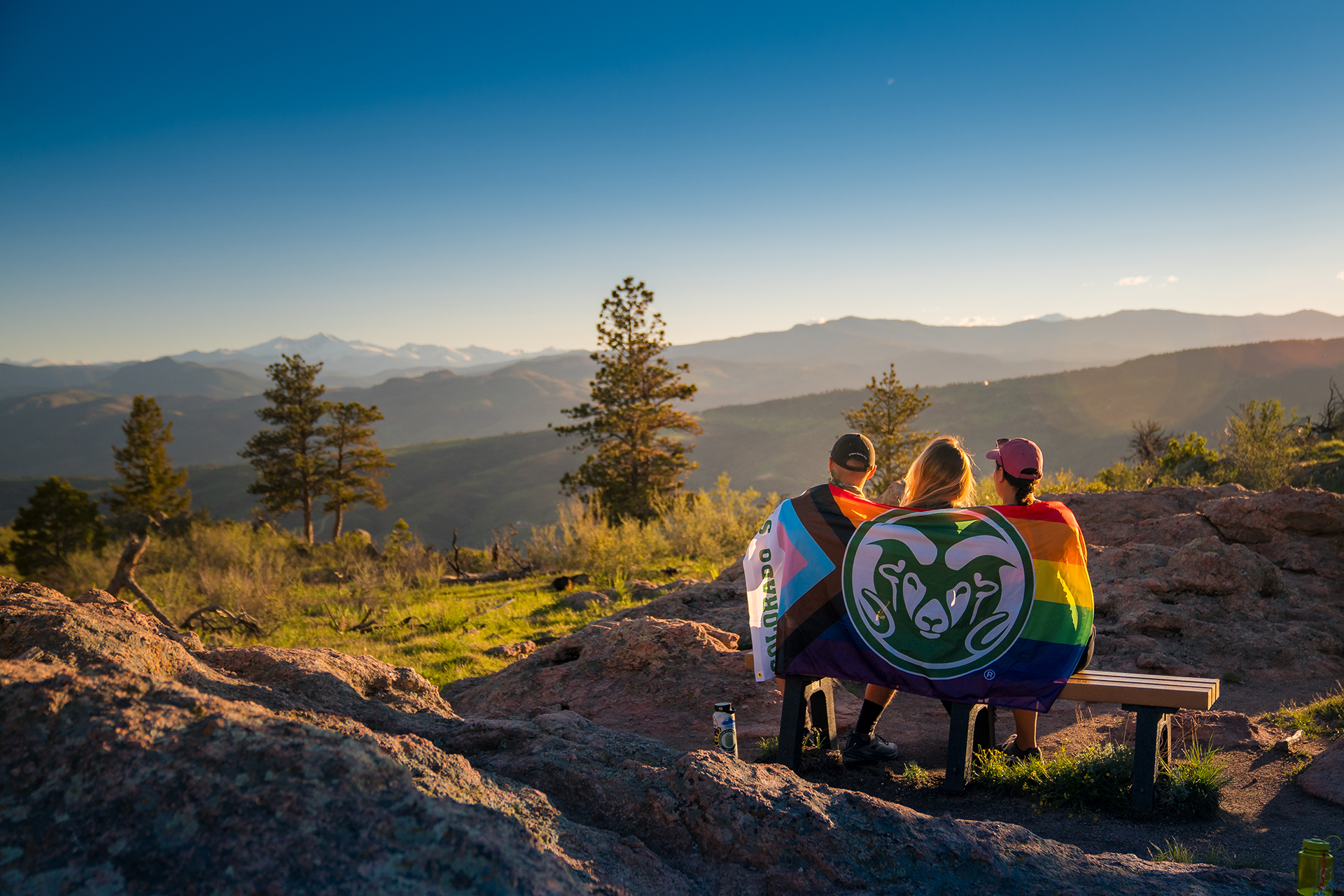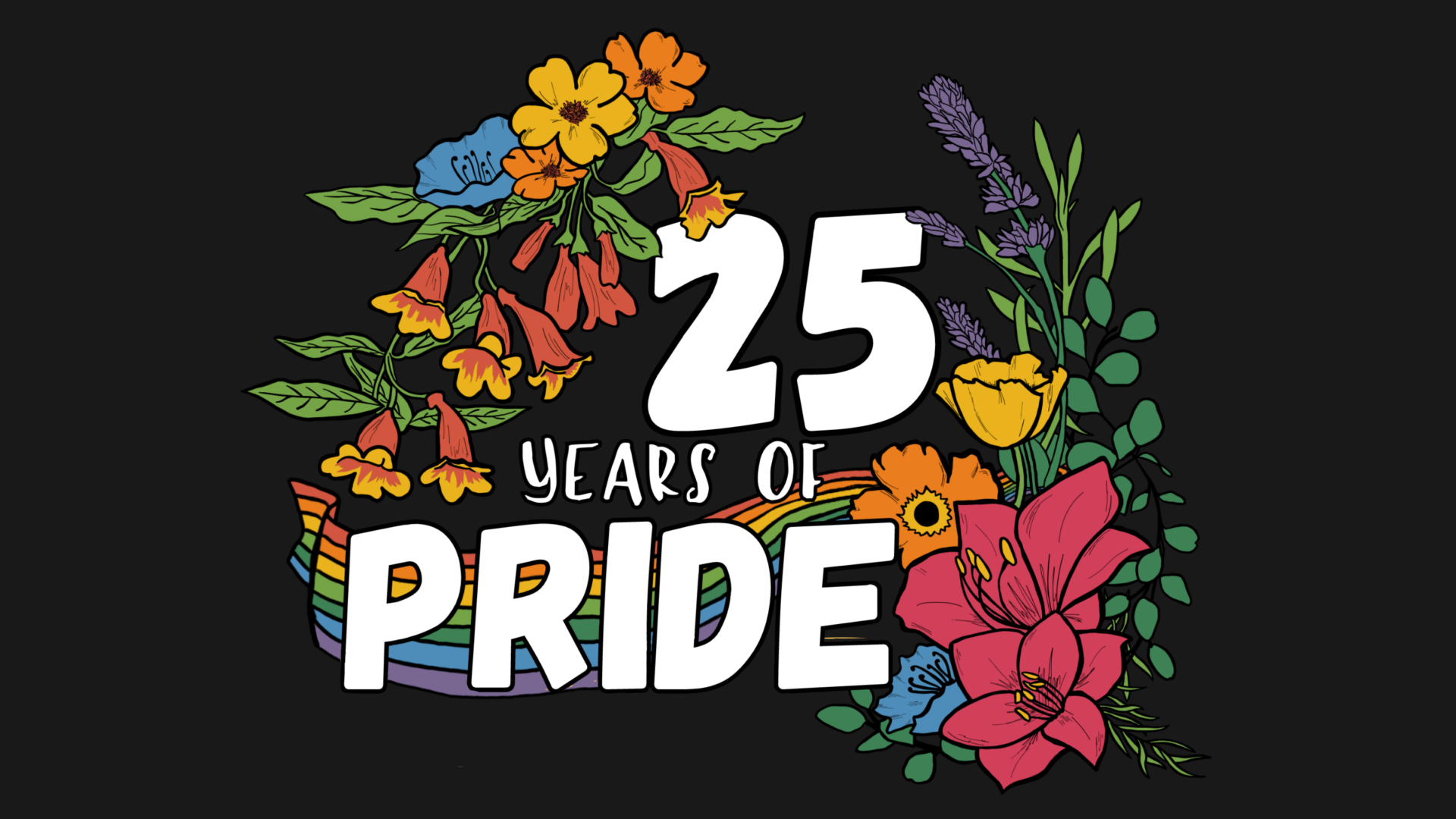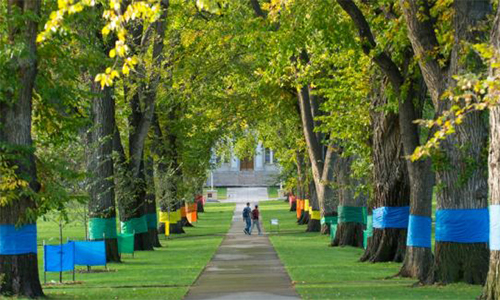
Tucked cozily in a corner on the main floor of Colorado State University’s Lory Student Center, there is a place where change is made. A place where students can slowly release the breath they’ve been holding — some for years — and feel a sense of safety. A place where people who have traveled a difficult road gather in determination to pave an easier path for those that walk behind them. An invitation to let one’s hair down — or, if it suits you better, to put it up.
Editor’s note
This piece was written by CSU student Ali Owens in collaboration with the CSU Pride Resource Center. Some names have been changed at the request of those interviewed.
This place is the Pride Resource Center, which as of the first of August, has been serving LGBTQIA+ students for 25 years.
And in such a politically charged moment in this country’s history, places like Pride are perhaps more necessary — and more life-saving — than ever.
For CSU student Peyton, programs and services offered by Pride have had a big impact.
“Queer Prom was the first time I got to go to a dance with someone I actually loved,” Peyton shared, speaking of the spring event that helped to recreate prom for those who couldn’t show up fully as themselves in high school. “I think that helped heal a hole in my heart I’ve carried for a long time.”
Along with Queer Prom, another signature springtime event hosted by the Pride Center is Lavender Graduation: an annual gathering and ceremony for LGBTQIA+ graduates, and one of the most profound celebrations of queer and trans identity many have ever witnessed.
“It meant the absolute world to me,” Peyton said. “It’s spaces like this that remind me of how truly beautiful queerness and found family can be.”
The feedback from events such as these stands directly at odds with so much of the rhetoric being levied at LGBTQIA+ community in recent years and months. More and more, state lawmakers grow bolder in their attempts to criminalize and stigmatize queerness and force trans people in particular back into the closet.
The prevalence of anti-trans legislation being drafted has increased steadily each year since 2019, and 2023 tops the charts: with a total of nearly 600 and counting, more bills limiting the rights and freedoms of transgender and gender non-conforming Americans have been filed so far this year than in the last five years combined. These relentless attacks encourage bigotry, hatred and violence.
“It’s scary out there,” said Danika, a current student who has been closely following the advancement of anti-trans legislation. “Even in a place like Fort Collins, which is relatively accepting — more so than others, anyway. Even here — it’s scary, especially for those who are visibly trans. The looks, the comments from strangers. And I know it’s nothing compared to what’s happening in other places right now.”
Danika has every cause for concern: Data from a study published in 2021 shows that transgender Americans are more than four times likely to be victimized by violent crime than their cisgender peers, and with the growing normalization of anti-trans sentiments, the disparity is only climbing.
Student staff at the Pride Resource Center report a significant number of prospective students from hostile states touring the CSU campus this summer, with their parents expressing safety concerns as a major reason for looking at schools away from home. For these parents, the existence of the Pride Center and the services and programs it offers is the evidence they need that their children can find acceptance and belonging.
“I just need to know he’s safe,” said parent Maritsa, speaking of her trans son who plans to attend CSU after finishing high school next spring. “I need to know he’s going to be okay.”

Despite the fervent need for inclusive and affirming spaces for LGBTQIA+ students, the Pride Resource Center is one of only a handful of similarly-equipped collegiate offices in the country, making it a truly special place, indeed.
Originally known as GLBT Student Services, the office opened on Aug. 1, 1998, with no physical location and a director who shared a position with Residence Life. In November 1998, the office gained a physical location, albeit a small one, and began operating — ironically enough — from a closet on the basement floor of the Lory Student Center. It moved to a larger space in 2002 and was shifted again the following year, this time to the Student Center’s main floor. This move came with more visibility and saw a staggering 175% increase in student contacts over the next year, attesting to its value and importance on campus.
As awareness of LGBTQIA+ identities and issues began to shift and grow over the years, campus-wide acceptance did, too. CSU officially added sexual orientation and gender identity to its non-discrimination policy in 2012, and the CSU Health Network added transgender care to its list of services covered by the university’s student health plan. The center, which at the time was known as the “Gay Lesbian Bisexual Transgender Queer Questioning and Ally Resource Center,” underwent a name change in 2016, officially becoming the Pride Resource Center.
Today, the office and its services are overseen by three full-time professional staff (Director Maggie Hendrickson, Assistant Director Josh Mack and Program Coordinator Soleil Gonzalez), with help from more than a dozen student staff members.
‘Personal growth and empowerment’
Pride offers a slew of programming and services to support student success and well-being. The new student seminar and peer mentoring program guide first-year and transfer students into their transition to campus, while scholarships and emergency grants are available for queer and trans students in need of aid, particularly for those without familial support. The Pride Leadership Council takes a hands-on, intersectional approach to advocacy and offers many opportunities for students to get involved in projects of their choosing and gain valuable experience; the center’s regular workshops and gatherings aim to build community, self-awareness, confidence, and career skills.
Perhaps the pièce de résistance is the Lavender Cabinet: a closet full of gender-affirming garments, menstrual products, makeup and gendered toiletries, and other supplies that are free for the taking to anyone who needs them — no questions asked.
Grace Storm, a fourth-year Clinical Psychology and Gender Studies major who works at Pride as a mentoring coordinator, recalled meeting two prospective students who were touring CSU from out of state. “I showed them around the space, and we got to the Lavender Cabinet,” they shared. “One of them asked me about pricing — asking if things were sold at a low cost, stuff like that. I told them everything was free, and they started crying. It was this moment of beautiful queer joy at being supported and finally being in a space that felt safe.”
Brandon Paez, an alum and mental health professional, speaks passionately about the need for services that affirm trans identities.
“Pride encourages personal growth and empowerment by providing the resources essential to well-being,” he said. “Queer students deserve to be supported and protected just as other students are. Pride lives up to this obligation.”
Not only that, but its mere presence, he asserts, has significant benefit. “It’s a tangible sign of the inclusion and care offered to LGBTQ+ students, who often have a more difficult time finding these vital necessities on campus.” The center, he said, “fosters a strong sense of belonging and safety among its students—necessities in a time during which queer lives and stories are under attack.
A recent survey of students and alumni who have utilized programming and services at Pride reveals common themes of belonging, community, and safety. Hannah Kramer, an alum who graduated in 2021, credits the center for helping her find her way in college.
“I had no friends — and really no clue how to make friends — until the Pride Leadership Retreat in September of my freshman year,” she said. “After that retreat, I knew I had found my forever people.”
Hannah joined, and eventually went on to lead, a student-run organization offering support and community to those with sexualities and gender identities that are not often recognized or represented in the LGBTQIA+ community, which she said was essential — both for her as a queer aromantic person and for many others.

‘Lasting strength, courage and hope’
Alum Yūji Hiraki, who felt a strong desire for queer community and a simultaneous fear of trying to find it, shares how involvement with Pride so drastically changed their trajectory.
“Growing up, I had learned that staying closeted meant that I was safe, even if I was desperately unhappy.”
Knowing they’d remain at a standstill unless they jumped in with both feet, Yūji applied for a job at Pride during their sophomore year.
“Accepting that job was honestly one of the biggest turning points in my life,” they said. “I was welcomed into a community that loved and celebrated me for who I was, and also challenged me to break out of my comfort zone, grow, and learn so many new things. The connections that I made through the Pride Resource Center gave me lasting strength, courage, and hope for my future — a bright future that I couldn’t have imagined before.”
“My depression had gotten pretty out of control,” said Craig, a senior computer science major, referring to his freshman year. “I was so lonely, so ashamed and afraid to be me. I grew up being told homosexuality was evil, and I knew I was gay when I was about 6, so… I hated myself. I was living a lie and I just had no hope. For me, for the future, anything. Pride helped me so much, once I got up the courage to go there, ask questions, get to know people — I’m not exaggerating: That place saved my life. If it wasn’t here, I wouldn’t be, either.”
Sadly, Craig’s feelings of isolation and hopelessness aren’t uncommon. The Trevor Project’s 2023 U.S. National Survey reported that 41% of transgender youth experienced significant suicidal ideation within the past year, with 14% following through with attempts. Nearly two-thirds of trans youth also reported struggling with depression — a struggle that only increases every time a new wave of anti-LGBTQIA+ legislation makes the news. These figures are significantly higher than those seen in cisgender and heterosexual youth, further underscoring the need for inclusive and affirming services like Pride.
‘This place saved my life’
In a letter of gratitude to the Pride Resource Center, Cindy, an alum who uses both she/her and they/them pronouns, shares the story of being outed to family without her consent during her time at CSU, an act that rocked their entire world.
“That was one of the toughest years of my life – I knew the type of culture and traditions that my family had, and I knew how they felt about people like me. I just never thought that they would have to find out, and I never thought that they would pretend I didn’t exist so quickly either. Those next couple months, the endless thoughts circled my head, just like when I was a kid. I used to often think about what life would be like if I were straight and I would wish every night that I didn’t have the feelings that I did, but they never went away. I used to pray that I would grow up ‘normal’ because I could never imagine my family loving me for who I was — and I was right.”
Though Cindy describes their loneliness at the time as “unbearable,” they are grateful to have found solace at Pride, where she was able to connect with other students who’d been through similar situations and understood.
“This place saved my life in so many ways. I truly mean it. I didn’t feel like there was (a life) worth living. There were so many times that I didn’t think I was going to make it through my first year at CSU.”
With the help of a scholarship from Pride, Cindy was able to stay in school, and today, she describes herself as a “first-generation, Asian, LESBIAN, college graduate.” They have since rebuilt a relationship with their family in which slow but steady progress is being made, and they state they are “alive, beyond happy, and unconditionally loved.”
None of this would have been the case, she said, without the support and affirmation she received at Pride.
“Centers like this matter. They save people’s lives. This place taught me how to love myself. It taught me what life has to offer.”
‘Queer joy is an act of resistance’
Outside the main door of the Pride Resource Center, a poster hangs, proclaiming for all to see: “Queer Joy is an Act of Resistance.” Anyone with a marginalized identity knows all too well how elusive joy can be, especially when their identity is weaponized against them. At the Pride Center, however, laughter is a near-constant backdrop, the sounds of community spilling over into the hallway. This is not accidental, but intentional; Pride’s professional staff works hard to make space for difficult and valid feelings, experiences and realities while also maintaining a constant, resolute undercurrent of unapologetic queer joy.
“No matter your story, there are always people at Pride who will see you, value you, and cheer you on,” states 2023 alum Charlie Williamson, a former Pride staff member and dauntless advocate for marginalized students on campus. “When the world seems full of the scariest types of people, places like Pride showed me that there is hope, and that if I take what I learned there, I have the chance to make the world a little bit less scary for the people in my community.” They sum up their statement with a sentiment thousands of other Rams can agree with: “The Pride Center is home. Plain and simple.”